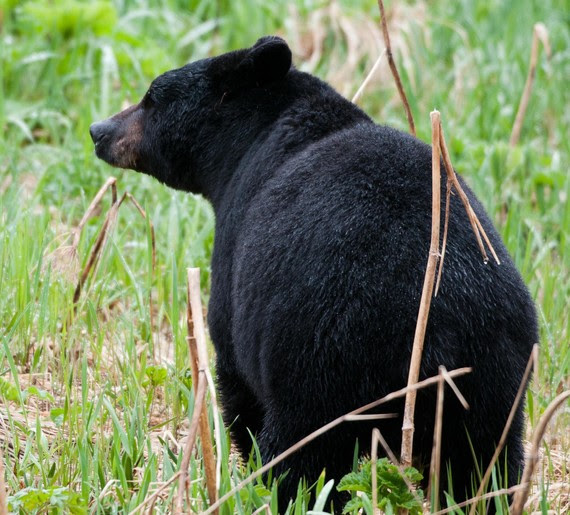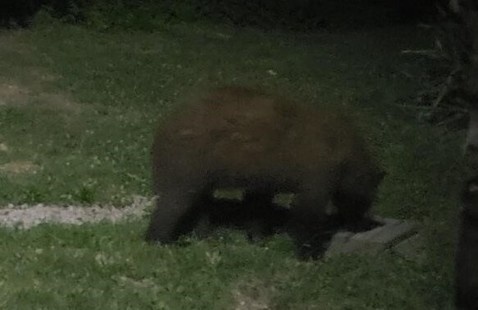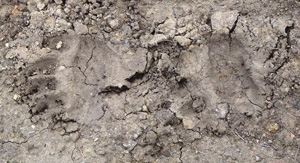
INDIANA – Indiana Department of Natural Resource biologists have confirmed sightings of a black bear in Vanderburgh, Pike, and Daviess Counties.

The bear is Indiana’s fourth visiting bear and a sign of expanding populations in neighboring states.
In recent years, four black bears have been confirmed (2015, 2016, 2018, 2021) in Indiana.
If you see a bear or signs of a bear, please report it.
DNR biologists use these reports to track bear movements and learn more about which of Indiana’s habitats appeal to bears.

Black bears are rarely aggressive toward people. Help protect both bears and people by reducing the potential for human-bear conflict.
If you see a black bear
- Enjoy it from a distance.
- Do not climb a tree.
- Advertise your presence by shouting and waving your arms and backing slowly away.
- Never attempt to feed or attract bears.
- Report bear sightings to the Indiana Division of Fish & Wildlife
Description
- Black bears are typically black with a tan muzzle, though farther West coloration can vary to brown and cinnamon.
- Black bears have a long snout, rounded ears, and small eyes.
- Typically, males weigh 150-400 pounds and females weigh 100-250 pounds.
- Black bears are omnivorous, feeding on grass, seeds, berries, insects, rodents, and deceased animals.
- Black bears are intelligent and have a keen sense of smell and hearing.
- Black bears are generally timid and not aggressive toward people.
Living with bears
Residents in many states coexist peacefully with black bears by giving bears space and keeping attractants (food sources) secure. The goal is to prevent conflict by discouraging bears from associating humans and human dwellings with food. To reduce or eliminate conflict with bears, practice the following if bears are present in your area:
- DO remove bird feeders and bird food from late March through November.
- DO clean and store grills away after use.
- DO eliminate food attractants by placing garbage cans inside a garage or shed.
- DO pick ripe fruits and vegetable ASAP, or place an electric fence around them, to ensure bear cannot reach them.
- DON’T intentionally feed bears. Bears that become accustomed to finding food near your home may become “problem” bears.
- DON’T leave pet food outside overnight.
- DON’T add meat or sweets to a compost pile.
- DON’T climb a tree, but wait in a vehicle or building for the bear to leave the area.
Laws regarding black bears
Black bears were once an exotic species, and are now protected under Indiana Administrative Code 312 IAC 9-3-18.8.
Indiana Black Bear Encounters
Before 2015, when a black bear entered the state at the Michigan border, the last confirmed report of a black bear in Indiana was in 1871. In June 2015, wildlife biologists with the Indiana DNR verified the presence of a black bear in St. Joseph County. The bear was believed to be a young male. It spent most of the next five months in Indiana and was last reported in the state on Oct. 13, 2015. In March 2016, the bear emerged from its winter den in Michigan and, unfortunately, exhibited habituated behaviors, including a loss of fear of humans. Based on the Michigan Department of Natural Resources (MI DNR) “Problem Bear Management Guidelines,” such behaviors are considered a threat to public safety. Consequently, the MI DNR trapped and humanely euthanized the bear on April 9, 2016.

In July 2016, a black bear was confirmed in southern Indiana in Harrison, Washington, and Clark counties. Through reports received from Hoosiers and biologists, this bear was remotely monitored as it traveled north toward Big Oaks National Wildlife Refuge, where it overwintered. The following spring this bear then moved back south toward Harrison County. It is believed that this bear had crossed back into Kentucky in the summer of 2017.
In November 2018, a black bear was hit by a motor vehicle on Interstate 64 in Floyd County. The injured bear wandered into the heavy brush after the accident. One week later, reports from a Hoosier with trail camera evidence confirmed that this bear had traveled north, near Memphis, Indiana. It is believed that this bear later succumbed to injuries from the accident.

In June 2021, a black bear crossed into Indiana from Illinois. Reports of the bear from private landowners were confirmed in Vanderburgh County.



